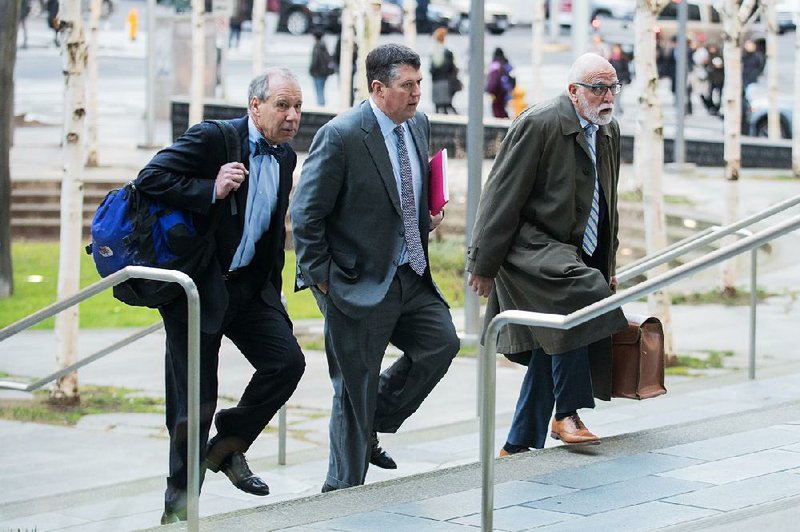Huawei Technologies Co. pleaded innocent to U.S. charges of trade-secret theft, a day before the company learns whether Canada will start extradition proceedings for its chief financial officer.
China's biggest smartphone maker and its U.S. affiliate appeared Thursday morning in federal court in Seattle to answer to charges that they engaged in a scheme to steal trade secrets from T-Mobile US Inc. and also committed wire fraud and obstruction of justice. The plea was entered before U.S. District Judge Ricardo Martinez and a trial was scheduled for March 2 next year.
The arraignment comes just a day before Canada's deadline to decide whether to order the start of extradition hearings against Huawei Chief Financial Officer Meng Wanzhou, who is wanted in the U.S. on fraud charges. In a separate indictment filed in Brooklyn, U.S. prosecutors allege she lied to banks to trick them into processing transactions for Huawei that potentially violated Iran trade sanctions.
The two cases have intensified the spotlight on Huawei, which has come to symbolize China's economic rise and challenge to the U.S.' status as the world's top superpower. In particular, the decision to prosecute Meng -- daughter of billionaire Huawei founder Ren Zhengfei -- has sparked an unprecedented diplomatic dispute, with Canada trapped in the middle.
If history is any guide, Canada will probably start extradition proceedings, which will set in motion a process that promises to be long and politically volatile. China has demanded that Canada release Meng and, since her December arrest in Vancouver, has detained two Canadians on national-security grounds and sentenced a third to death for drug trafficking in China.
Meng is next scheduled to appear in court Wednesday. If extradition proceedings begin, the process is likely to drag on for months, possibly years.
Martinez reviewed the 10 counts of the indictment aloud, while prosecutors explained the penalties the company faces. Lawyers for both sides declined to comment after the hearing.
Prosecutor Todd Greenberg told Martinez that the government proposed the 2020 trial date because "this is a complex case, more complex than many cases that come before the court."
In the trade-secrets case, prosecutors said in a January indictment that from 2012 to 2014 Huawei stole information from T-Mobile's Bellevue, Wash., headquarters contained in "Tappy," a robotic phone-testing system.
The U.S. says it uncovered Huawei email messages showing the company offered bonuses to employees for information stolen from companies worldwide. Huawei faces fines of more than $5 million, or three times the value of T-Mobile's secrets, according to the government.
T-Mobile protected the robot with patents, security cameras, a guard and confidentiality agreements. Huawei engineers in China allegedly pressed their U.S.-based colleagues for details on how the device worked, according to court filings. Tensions rose. "We CAN'T ask TMO any questions about the robot. TMO is VERY angry the questions that we asked," a Huawei employee in the U.S. allegedly said in an e-mail.
The indictment says that in May 2013, a Huawei engineer placed a robot piece into his laptop bag, left with it and, along with a colleague, took measurements and photos and sent them back to China.
Huawei in January issued a statement saying it had done nothing wrong. "The company denies that it or its subsidiary or affiliate have committed any of the asserted violations of U.S. law set forth in each of the indictments," Huawei said.
The case already has been the subject of a civil suit. In 2017, a jury awarded T-Mobile $4.8 million in damages from Huawei for breach of contract but rejected allegations of misappropriation of trade secrets. The parties later agreed to drop the case after settlement talks.
Accusations of theft go back years. In the early 1990s, Chinese-made fabric cutters began appearing on the market. Robert Stevenson, CEO of Eastman Machine, said the new machines were clones of those made by his Buffalo, N.Y., company that makes machines that cut cloth and has since the 19th century.
Sales of the genuine machines plummeted, and Eastman went from having 150 union workers and selling 20,000 machines annually worldwide, to 58 workers and selling fewer than 8,000, Stevenson testified to Congress in 2005.
"These thefts in China not only have cost me 50 jobs, they probably have cost millions of jobs," Stevenson said in an interview. "Right now, in this discussion with China, with the Trump administration, hopefully they're doing something about it."
Most countries steal less as their economy matures, but China shows a different pattern, said Derek Scissors, an economist at the American Enterprise Institute.
"As China has become more advanced, they've been able to benefit more from [intellectual-property] theft," Scissors said in an interview.
Business on 03/01/2019
